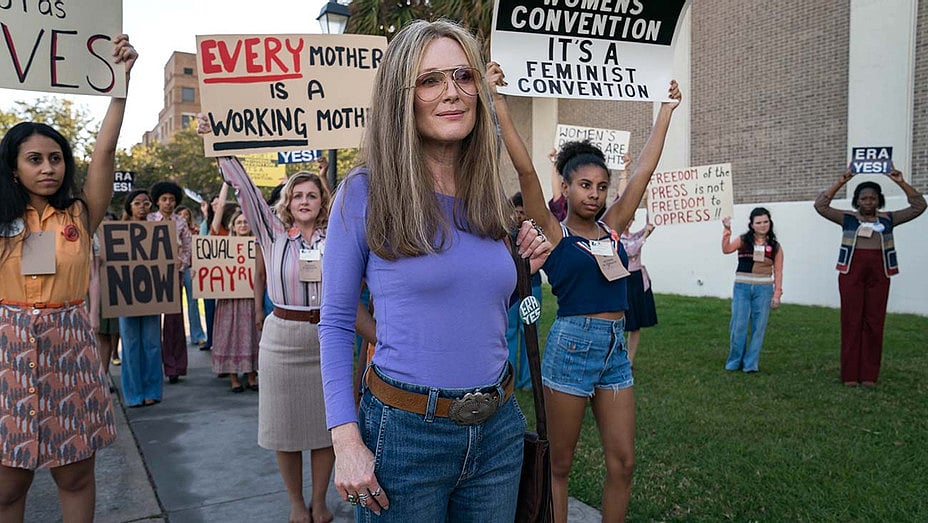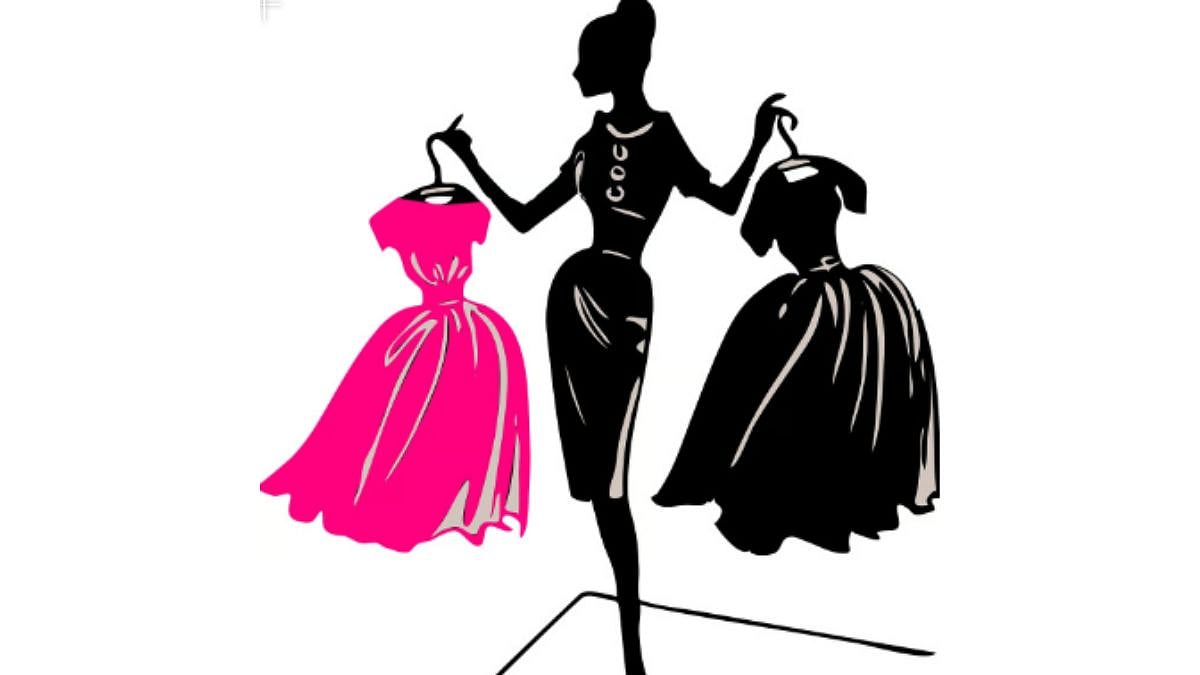Whenever a film, book, or show comes up about the women’s liberation movement, Gloria Steinem invariably makes an appearance, either as herself, or an actress playing her. So it was about time her exciting and trail-blazing life was turned into a film, and a few days ago, The Glorias directed by Julie Taymor, based on Steinem’s 2015 memoir, My Life On The Road, came out to much acclaim.
Steinem never was an ivory tower feminist, she marched alongside civil rights and women’s groups that had erupted into the streets in sixties and seventies America, to demand justice for all. That was the time when marriage and workplace laws were skewed against women, so it took a tough battle for social and legal reform; Steinem was right at the forefront, along with other leaders of the women’s movement, as well as those fighting against racial discrimination. She had to bat away comments about her good looks making her the face of the women’s movement, but the mostly male-dominated media of the time was horribly condescending towards their ideas, and if her beauty meant that the movement made it to the cover of magazines, it served a purpose.
She dressed mostly in severe black and cowboy boots, wore large aviator glasses that covered half her face, but sneering male interviewers on TV and in print would always comment on her sexiness and ask her if she planned on getting married. Esquire rather flippantly called her “the intellectual’s pin-up.”
Steinem is quoted –erroneously as it happens—to have said that a woman needs a man like a fish needs a bicycle, and the words actually uttered by Australian activist Irina Dunn, were bandied about to make her sound anti-male and anti-family. Then, as now, the matter of reproductive rights for women was a subject of much aggression from conservatives and Steinem’s pro-abortion views made her a hate figure for the religious right.
Taymor’s film is designed like a road trip through Steinem’s tumultous life, and she is played by four actresses at different ages-- as a child by Ryan Kiera Armstrong, as a teenager by Lulu Wilson, as a young woman by Alicia Vikander and in middle age by Julianne Moore; at the end she appears herself, a strong octogenarian, who still has plenty of fight left in her.
The daughter of an itinerant antiques dealing father and an anxious but supportive mother, Steinem had travelled to India on a fellowship for two years, an adventure for which she had a then illegal abortion, and never regretted remaining childless. The film captures the brave young woman in a sari, travelling in second class coaches, going to villages in bullock carts, sleeping on the mud floors and, through meetings with Dalit women, understanding how patriarchy is tougher on them, as it is for black, native American and Asian women in the US.
Her mother was forced to write journalistic pieces under a male pseudonym, because in her time, no paper or magazine would publish women’s writings. When Steinem completes her college education and starts working in New York as a journalist, she is given silly assignments about women’s clothing or dating rules, and made to prepare coffee for the males, when she is keen on covering the civil rights movements raging outside. She quits her first job when the editor casually makes a pass at her. Unfortunately for her, the piece she wrote for Show magazine exposing the deplorable working conditions of Bunny Girls in Hugh Hefner’s Playboy clubs, brought her fame, but it also took a while for her to play down that image. When women’s issues were not taken seriously or given any coverage in mainstream publications, it was easy to dismiss as fluff even the scathing piece she wrote.
The need to have women’s voices heard led Steinem to co-found Ms magazine in 1972, along with her activist teammates like the flamboyant Florynce ‘Flo’ Kennedy (played by Lorraine Toussaint), Dorothy Pitman Hughes (Janelle Monae)—the first cover was a multi-armed Kali-like figure of a woman juggling many roles. Male detractors predicted the magazine would not last, and were proven wrong. Other women who form strong bonds with her include outspoken Congresswoman Bella Abzug (Bette Midler) and Native American firebrand leader Wilma Mankiller (Kimberly Guerrero), leading her to be able to express various perspectives of race and gender issues. Her life was turned into a road show—endless travel, speaking assignments, participation in rallies, along with her thoughtful and provocative writing that influenced the nascent feminist movement, and continues to do so when the third wave is up and running.
Since the fellowship days, Steinem has visited India several times. I recall a meeting with her in 2007, at the modest office of the women’s group Vacha at a suburban municipal school, and writing a somewhat gushy piece; to quote a part: ‘The discovery of the feminist writings of the time helped me understand my own mind and chart the course of my future. It was as if Gloria Steinem (and Simone de Beauvoir, Germaine Greer, Kate Millet, Betty Friedan, Naomi Woolf, Susan Faludi) held me by the hand and pointed the way.
'Anyone who wrote, "We are talking about a society in which there will be no roles other than those chosen or those earned; we are really talking about humanism," was my hero.
'I devoured inspiring feminist writings, grabbed old copies of Ms magazine whenever I could, and carried Outrageous Acts and Everyday Rebellion and Revolution from Within: A Book of Self-Esteem as my bibles. She wrote with amazing clarity, great wit (the piece If Men Could Menstruate is a masterpiece) and lack of cant… Since Gloria was the postergirl of feminism, things have changed, not necessarily for the better. Feminism is constantly under attack, more from women who gained from the struggles of other women, than by men; Gloria is asked if she ever tires of the fight, and she says, we all get tired, but must make it fun. If the word ‘feminist’ is demonised, we can choose our own words. Suddenly she makes the battle sound like a party, and maybe that’s how it should be.
“Women are not women’s worst enemy,” she says, “we never have the power to be.”
“We never said we wanted to have it all,” she says, “the enemy did. It is not possible to have it all.”
“Activism is harder not to do than to do,” she says, “because not doing anything will make you feel bad afterwards. There are no guarantees that it will work, but at least it makes you feel good”.’
In the film, Gloria Steinem at various ages is seen having conversations with herself, in a way passing on her own energy to her older self, and wisdom to the younger. With its non-linear structure (somewhat like Tod Haynes’s 2007 biopic of Bob Dylan, titled I Am Not There, in which six actors portrayed the iconic singer-songwriter), and bursts of surreal imagery, the film catches the spirit of Steinem, as well as the zeitgeist of an age of radicalism. When things look bleak for women in spite of all the gains of the feminist movement, maybe it is time to look back and be inspired by that anger.
The writer is a Mumbai-based columnist, critic and author.









